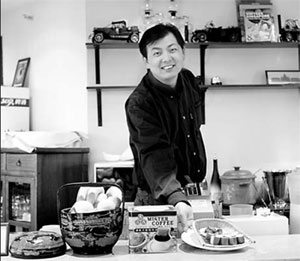Recipe for success
James Ong considers himself not just a restaurant owner, but a promoter of all things Malaysian. "Malaysians are proud of their gourmet traditions," he says. "Many of my Malaysian friends working in Beijing take their colleagues to my restaurant to introduce them to Malaysian food and culture."
Like their culture, Malaysian food is a lovely fusion of Malay, Chinese and Indian origins. Ong cites the dish Cendol, green beans mixed with palm syrup and coconut milk, as a good example of the combination.
"Cendol was a Nyonya creation. Malaysian Chinese used pandan leaf juice to make starch noodles, which is mixed with coconut milk and coconut sugar, and with sago beans, and ice. Then, many Indian business people began selling it in Malaysia."
|
James Ong at his new restaurant in Beijing. |
James Ong has himself benefited from this cultural background. Being able to speak Mandarin, Malay, English, Cantonese and South Fujian dialect helps him communicate with guests from different cultures.
Ong specialized in design and decoration before coming to Beijing to work in a Malaysian food company in 2002. "I suggested to my boss that he should open a Malaysian restaurant," he says.
Ong then helped to manage the restaurant, before opening his own in 2006.
His first Malacca Legend Restaurant opened in Shunyi, offering Nyonya, or Malaysian-Chinese style food. Many consider it one of the more authentic Malaysian eateries in the Chinese capital. As he sat in his new restaurant at Ocean Paradise on the Eastern Fourth Ring Road, Ong frequently had to get up to greet guests and visitors. The new restaurant is decorated in the style of old early 20th century Malaysia, which resembles 1930s Shanghai.
Ong spends 10 hours everyday at his two restaurants. He eats his meals after the peak lunch time around 2 pm, and after dinner at around 9pm.
"Physically it might not be so tiring, but it does take a great deal of my time and mental effort."
Beijing's dining scene is extremely competitive. Still, among the sea of options there are only a few Malaysian restaurants. Plenty of other Southeast Asian restaurants, such as Thai eateries, are better known among the Chinese.
"It is not an easy line of business," he says. "There are so many details and procedures to consider, from shopping materials to getting a good dish out from the kitchen.
"One important thing that keeps me in the business is to see my efforts paying off. At the end of the day, when the guests are really satisfied with our food and service, it is gratifying."
The restaurant has been taking frequent orders from the Malaysian embassy and chamber of commerce. When asked how he rates his restaurants, Ong gives himself 75 points out of 100.
"I have not done much wrong in the major aspects - taste of food, hygiene, management of the kitchen and dining room, and greeting guests," he says. "But there are plenty of details left to improve."
Ong hired a Malaysian chef to supervise the work in the kitchen. He imports sauces and seasonings from Malaysia, to guarantee authentic taste. When the chef is not in the house, he inspects the kitchen himself to make sure everything is cooked properly.
Ong spends a fair amount of his time chatting with guests, to see if they have any particular needs, and if they are satisfied with the food.
"I treat the restaurant as my home," he says. "I greet my visitors, introduce myself, and the cuisine."
Most of Ong's employees are Chinese. He places great importance on communicating with them, and training them to provide good service. Beijing has changed a lot since Ong first came to Beijing.
"When I was first in Beijing, I found many inconveniences, especially when I visited a local hospital," he recalls. "Everything is improving. I see huge changes all the time. Doing business is a lot easier."
Ong, who does not drink or smoke, finds one thing difficult to take: Chinese white spirits. He recalls a time when his Chinese friends tried to make him drink it.
"I licked a little white spirit at my wedding ceremony, and tears immediately came," he says. After that he faced situations when he was asked to drink. But he has mostly declined. "I told my Chinese friends that drinking or not is not a matter of saving face."
Ong believes a prominent characteristic of Malaysian culture is respect for different cultures. "The sense of nationalism is not very strong."
"Malaysians are never aggressive, nor radical," Ong says. "We are usually gentle and friendly."
Ong married his wife, a Beijinger, in 2004. Their son is now two years and four months old. "After I had my son, the happiest thing is to watch him grow up."
|
Ong in the kitchen of his new restaurant. Photos by Guo Yingguang |
Ong's plan is to have two kids, and educate them in China. But he says he won't spoil them like single children in China.
"Many of these children grow up and feel everybody owes them something," he says. "They become too self-centered. They need to learn how to become independent."
Ong likes Chinese history, and ancient Chinese saints. He also regularly reads books by Chinese contemporary writers like Yi Zhongtian and Yu Dan writing about Lao Zi, Zhuang Zi and Confucius.
He believes that everyone should fulfill their responsibilities in life, respect their line of business and be respected by others.
"For me, I want to be a good husband and a good dad," he says. "I don't want to be too rich. I just want be healthy and not too poor. I have plenty of specific plans for my restaurant. Hopefully, I can make restaurant management more systematic."
He plans to watch basketball and badminton at the upcoming Olympic Games in Beijing. The 1.87-m-tall Ong played basketball and volleyball at school, and still swims and plays badminton.
Ong expects plenty of foreign guests at the restaurant during the Olympics, including his Malaysian compatriots.
"I will certainly prepare for that," he says. "The occasion will be a good chance for Beijing to climb up the ladder."
(China Daily 03/19/2008 page20)
















